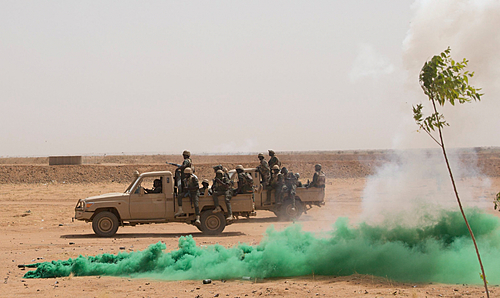
At 3 am on 26 July 2023, Niger’s presidential guard arrested President Mohamed Bazoum in Niamey, the country’s capital. The troops, led by Brigadier General Abdourahmane Tchiani, closed the country’s borders and declared a curfew. The coup d’état was immediately condemned by the Economic Community of West African Statesfor the African Union and for European Union. Both France and the United States, which have military bases in Niger, said they were following the situation closely. A conflict between the army, which took a stand in favor of Bazoum, and the presidential guard, even threatened the capital, but was soon resolved. On July 27, Army General Abdou Sidikou Issa issued a statement saying he would accept the situation to “avoid a deadly confrontation between the different forces that […] could cause a bloodbath”. Brigadier General Tchiani went on television on July 28 to announce that he was the new president of the National Council for the Safeguarding of the Homeland (National Council for the Safeguarding of the Fatherland or CNSP).
The coup in Niger follows similar coups in Mali (August 2020 and May 2021), Burkina Faso (January 2022 and September 2022) and Guinea (September 2021). Each of these coups was led by military officers angry at the presence of French and American troops and the permanent economic crises inflicted on their countries. This region of Africa – the Sahel – has faced a cascade of crises: the drought of the land as a result of the climate catastrophe, the increase in Islamic militancy due to the NATO war in Libya in 2011, the increase in smuggling networks for the trafficking of weapons, people and drugs across the desert, the appropriation of natural resources – including uranium and gold – by Western companies that simply did not pay adequately for these riches, and the entrenchment of Western military forces through the construction of bases and the performance of their armies with impunity. .
Two days after the coup, the National Council for the Safeguarding of the Homeland (CNSP) announced the names of the ten officers who will lead it. They come from all armed forces, from the Army (General Mohamed Toumba) to the Air Force (Colonel Major Amadou Abouramane), including the National Police (Deputy General Assahaba Ebankawel). It is already clear that one of the most influential members of the CNSP is General Salifou Mody, former Chief of Staff of the Armed Forces and leader of the Supreme Council for the Restoration of Democracy, who led the February 2010 coup against President Mamadou Tandja and who ruled Niger until Bazoum’s predecessor, Mahamadou Issoufou, won the 2011 presidential election. It was during Issoufou’s tenure that the US government built the world’s largest drone base in Agadez and that special forces French troops garrisoned the town of Irlit on behalf of the uranium mining company Orano (formerly part of Areva).
It is important to note that General Salifou Mody is seen as an influential member of the CNSP given his ascendancy over the Army and his international contacts. On February 28, 2023, Mody met with the Chairman of the Joint Chiefs of Staff, General Mark Milley, during the Conference of African Chiefs of Defense in Rome to discuss “regional stability, including cooperation against terrorism and the ongoing fight against violent extremism in the region”. On March 9, Mody visited Mali to meet Colonel Assimi Goïta and the Chief of Staff of the Malian Army General Oumar Diarra to strengthen military cooperation between Niger and Mali. A few days later, on March 16, US Secretary of State Antony Blinken visited Niger to meet with Bazoum. In what many in Niger perceived as a departure from Mody, he was appointed on 1 June as Niger’s ambassador to the UAE. They say that Mody, in Niamey, is the voice that speaks in the ears of Brigadier General Tchiani, the acting head of state.
Corruption and the West
A highly informed source in Niger tells us that the reason the military moved against Bazoum is that “he is corrupt, a pawn of France. diverted public funds, many of which took refuge in foreign embassies”. The issue of corruption looms over Niger, a country with one of the most lucrative uranium deposits in the world. The “corruption” spoken of in Niger does not refer to small bribes by government officials, but to an entire structure – developed during French colonial rule – that prevents Niger from establishing sovereignty over its raw materials and over its development.
At the heart of “corruption” is the so-called “joint venture” [empresa conjunta] between Niger and France, called Société des mines de l’Aïr (Somaïr), which owns and operates the uranium sector in the country. Surprisingly, 85% of Somaïr is owned by the French Atomic Energy Commission and two French companies, while only 15% is owned by the government of Niger. Niger produces more than 5% of the world’s uranium, but its uranium is of the highest quality. Half of Niger’s export earnings come from sales of uranium, oil and gold. One in three light bulbs in France is powered by uranium from Niger, while 42% of the African country’s population lives below the poverty line. The people of Niger have seen their wealth slip through their fingers for decades. As a sign of government weakness, over the past decade, Niger has lost more than $906 million in just 10 arbitration proceedings brought by multinational corporations before the International Center for Settlement of Investment Disputes and the International Chamber of Commerce.
African countries that have experienced anti-Western coups in recent years: Guinea, Mali, Burkina Faso and now Niger. (Image: OperaMundi / maps.stamen)

France stopped using the franc in 2002 when it switched to the euro system. However, fourteen former French colonies continued to use the African Financial Community (CFA) as a currency, which gives France immense advantages (50% of these countries’ reserves have to be kept in the French Treasury and French devaluations of the CFA – as in 1994 – have catastrophic effects on the countries that use it). In 2015, Chadian President Idriss Déby Itno said that the CFA “pulls African economies down” and that “the time has come to break the rope that prevents Africa’s development”. Currently, there is talk throughout the Sahel not only about the withdrawal of French troops – as occurred in Burkina Faso and Mali – but also about the breaking of French economic dominance over the region.
The new non-alignment
At the 2023 Russia-Africa Summit in July, Burkina Faso’s leader, President Ibrahim Traoré, wore a red beret reminiscent of the uniform of his country’s slain socialist leader, Thomas Sankara. Traoré reacted strongly to the condemnation of military coups in the Sahel, and also to a recent visit by an African Union delegation to his country. “A slave who does not rebel deserves no pity,” he said. “The African Union must stop condemning Africans who decide to fight their own Western puppet regimes.”
In February, Burkina Faso hosted a meeting that included the governments of Mali and Guinea. On the agenda is the creation of a new federation of these states. It is likely that Niger will now be invited to these conversations.
Vijay Prashad is an Indian historian, editor and journalist. He is a fellow writer and chief correspondent for Globetrotter. He is editor of LeftWord Books and director of Tricontinental: Institute for Social Research. He is a non-resident senior fellow at the Chongyang Institute of Financial Studies at Renmin University of China. He has written over 20 books including The Darker Nations and The Poorer Nations. His most recent books are Struggle Makes Us Human: Learning from Movements for Socialism and (with Noam Chomsky) The Withdrawal: Iraq, Libya, Afghanistan, and the Fragility of US Power.
Kambale Musavuli, originally from the Democratic Republic of Congo (DRC), is an important Congolese political and cultural voice. Based in Accra, Ghana, he is a policy analyst at the Center for Research on Congo-Kinshasa.
Translation by Pedro Marin.
Source: www.brasildefato.com.br

